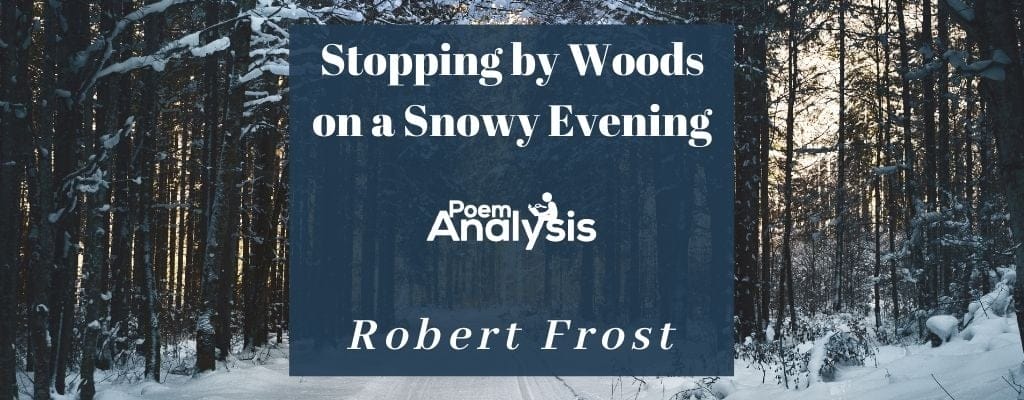Growing up in San Francisco and New Hampshire, Robert Frost wrote poems that transcended age and time, pushing the reader into a vortex of imagery. The poem, ‘Stopping by Woods on a Snowy Evening,’ explores the motivations of the poet, the inherent moods of the narrator, and his fixation with woods for an inner reason. Robert Frost(Bio | Poems) is known as a ‘regional poet’ willing to forge his own path and ignore the poetic trends of his time.
Stopping by Woods on a Snowy Evening Robert FrostWhose woods these are I think I know. His house is in the village though; He will not see me stopping here To watch his woods fill up with snow.My little horse must think it queer To stop without a farmhouse near Between the woods and frozen lake The darkest evening of the year.He gives his harness bells a shake To ask if there is some mistake. The only other sound’s the sweep Of easy wind and downy flake.The woods are lovely, dark and deep, But I have promises to keep, And miles to go before I sleep, And miles to go before I sleep.
Summary
‘Stopping by Woods on a Snowy Evening‘ by Robert Frost(Bio | Poems) narrates the account of a man standing deep in the woods, torn between two choices.
The narrator of the poem has stopped by for a brief moment amid a snowy evening in the woods, transfixed by the mesmerizing scenes unfolding. As he takes a moment to indulge in a dosage of naturalistic beauty, he’s torn between staying in the woods and heading home. As readers explore the motivations and hidden inclinations, the poem gets intriguing, and a clever play on words renders a diverse meaning. Robert Frost has a penchant for selecting two roads, as was the case in ‘The Road Not Taken,’ where the narrator again arrives at a crossroads, deciding his permanent path.
Meaning
The crux of the poem lies in the conflict in a moment of solace vs pending obligations.
The narrator is spellbound by the momentary distraction from worldly responsibilities, allowing himself a moment of peace. Being naturalistic to the core, Robert Frost(Bio | Poems) grounds his character in a forest, mesmerized by the snowy evening. The poet mildly indicates the presence of a human close by, albeit in-doors, oblivious to the passerby.
The woods, for the narrators, are immensely thick and dark and stand in all their glory. More so, the poet paints an image etched in natural beauty, drawing deep sensory emotions from the reader. The woods are blanketed in thick snow, amplifying its beauty factor. The narrator voices his concern about losing his way through the woods since it gets immensely dark at night time, and he decides to better get a move on.
Speaker
Some readers and scholars have suggested that the speaker of this poem is Robert Frost himself.
Frost experienced a similar moment to the narrator when he took a trip down to his local market and was largely unsuccessful in making enough money to see his children through Christmas with the presents he wanted to buy them. Overwhelmed, he experienced a difficult journey home, during which he stopped partway through to cry. After a few minutes, the ringing of bells on his horse helped him to regain his composure, and he continued his journey home. Ultimately, Frost was able to get past his tough time, but the nature of his struggle is clearly expressed in this simple poem, filled with a yearning for peace.
Despite this compelling anecdote, without clear evidence that the poet intended himself to be the narrator, it’s important that readers look at the poem from an objective point of view. The narrator appears to be a traveler, a man or a woman, perhaps a traveling salesperson. They are burdened with obligations and a desire to abandon them all. But, they are clear-minded enough to see that society has rules one must follow.
Symbols
Throughout this piece, the poet engages with one primary symbol– the woods.
They represent one side of the two choices that the speaker has before them. They could head towards the woods, or they could return to their mundane obligations. The woods represent a freedom of sorts, liberated from the constraints of society and without the endless tasks everyday life demands on the average person. There, one could live within the natural world and enjoy the peace nature has to offer. But, it should be noted the woods are also “dark and deep.” They also represent darkness and present the speaker with the option of “sleep,” or as some have interpreted it, death.
Structure and Form
Readers and children alike have taken a liking to this naturalistic poem. This poem has a ring when recited loudly. It may feel akin to a nursery rhyme. Ring, rhyme, and reason flow systematically throughout the poem. It works within a classic Rubaiyat stanza. Rubaiyat is a Persian term for ‘quatrain’, denoting a four-lined stanza. The scheme of the Rubaiyat stanza is as follows: AABA, BBCB, CCDC, and DDDD.
The poem, ‘Stopping by Woods on a Snowy Evening,’ is composed in iambic tetrameter, pioneered by Edward Fitzgerald(Bio | Poems). All the respective verses conform to the a-a-b-a rhyming scheme. On the whole, the rhyme scheme follows the pattern of aaba-bbcb-ccdc-dddd convention.
Moreover, the second verse solidifies the rhyming structure of the poem. As mentioned above, the poem is written in A / A / B / A style, with the first line of each stanza rhyming with the third line of the previous one — in this case, “here” and “queer.” This is a simple structure that flows very nicely and makes the read easier and more pleasant.
Literary Devices
Robert Frost captures the essence of peace during snowfall well. One can notice how every rhyming word ends with the euphonic “oh” sound and how every word in the stanza is either monosyllabic or disyllabic, making for a simple flow, an easy read, and a simple sense of peace throughout. There is a noticeable consonance in the third stanza with the “s” sound;
He gives his harness bells a shake
To ask if there is some mistake.
The only other sound’s the sweep
Of easy wind and downy flake.
It’s very easy to read and flows extremely well. The continuation of the simple A / A / B / A structure of the poem further enhances the need Frost has for his reader to understand the natural flow that accompanies a walk in the woods on a snowy evening.
In the fourth verse, “sleep” is the metaphor used for true rest, the rest of a fulfilled promise, of a fulfilled day, or even a fulfilled life. This is the only stanza of ‘Stopping by Woods on a Snowy Evening’ that consists of four rhyming lines due to the repetition of “and miles to go before I sleep,” likely because there is no next verse to continue the verse-to-verse rhyming pattern.
Themes
Frost engages with themes of exhaustion, fatigue, depression, optimism, and commitment throughout this poem. His speaker feels out of place and out of time. He’s completely alone in the world, at least at this moment, and feeling a small sense of the tranquility and isolation that only nature can bring. There are darker undertones to this poem as well. The suggestion of “sleep” has reminded some of death/suicide and a desire to escape permanently from the demands of everyday life.
Additionally, the poet makes sure to remind the reader that life doesn’t stop no matter how isolated from it a person is. This poem could be looked at as a simple commentary on life — a statement suggesting that if one stands around and watches his or her life for too long, one might lose it entirely. At the end of the poem, the narrator returns to their journey, looking forward to the conclusion of the darkest evening of the year and the sleep, or perhaps death, they’ve earned.
Significance of the Title
Very often, the title of a poem is presented as a grand, all-encompassing, thought-provoking idea that inspires readers with its symbolic power.
Other times, it is nothing more than a statement about the poem’s content. Such is the case with ‘Stopping by Woods on a Snowy Evening,’ which is about exactly what the title suggests.
Analysis, Stanza by Stanza
Stana One
Whose woods these are I think I know.
His house is in the village though;
He will not see me stopping here
To watch his woods fill up with snow.
The poet begins the poem, ‘Stopping by Woods on a Snowy Evening,’ with his speaker intentionally considering and analyzing the fact that these woods seem familiar to them. Technically, they are trespassing on another person’s property — a forest on land that does not belong to them — but knowing that the man won’t be around for a while, the speaker can’t stop themselves from taking a few moments to watch the peaceful descent of winter through this forest. Though they don’t refer to the subject, later on, it’s understood that both shared memories in the past.
The poet points at the evidence of civilization nearby with the words ‘house’ and ‘village.’ They are aware of other people, but they don’t know the speaker is there. Moreover, they’re sure that the tenant didn’t notice them; given the heavy snow in thick woods, most people remain indoors; the narrator seems to enjoy this solitary existence. The narrator is passing by someone’s residence, feeling satisfied with their shadowy existence. They have stopped briefly to take in the wondrous view in front of them.
Stanza Two
My little horse must think it queer
To stop without a farmhouse near
Between the woods and frozen lake
The darkest evening of the year.
In stanza two, the narrator draws attention to the human aspect of peacefulness. It’s interesting for the speaker to note that the horse accompanying them on their journey isn’t able to fathom the speaker has stopped to stare at the woods.
With the phrase “the darkest evening of the year,” it is easy to assume that this poem takes place on the night of the winter solstice, but this can also be interpreted to refer to the more difficult times in a person’s life. “The darkest evening of the year” could be literal, or it could mean that the speaker is having a hard day. If so, it’s all the more reason to stop and take a breather from the stresses and difficulties demanded by life while their horse looks on without a care in the world.
Moreover, the narrator seems to be a considerate character interpreting the horse’s thoughts. The horse seems to be surprised at this sudden ‘intermission’ along the woods.
As the verse indicates, the intensity of the winter cold has rendered the lake frozen. But the stubborn narrator seems to adore the immediate present as opposed to imminent danger. The narrator is hinting at the immense darkness awaiting them. In the woods, night-time can be extremely distressing for the weary traveler miles away from home. The speaker is torn between two choices yet again: to head home or sink in the scenic view.
Stanza Three
He gives his harness bells a shake
To ask if there is some mistake.
The only other sound’s the sweep
Of easy wind and downy flake.
In stanza three, the reader of the poem should feel the same peace the narrator is describing. The narrator continues to describe the thoughts they believe are in the horse’s mind, which currently shakes its bell as it trudges along the road. The bells jingle playfully, indicating the horse’s inclination to leave the woods for good, which feels gloomy and solitary. Since the horse can’t speak its mind, the narrator chooses to.
The speaker is miles from anywhere, buried deep in the woods where the only sound is wind and snowflakes falling. It is Robert Frost’s imagery at its best. The poet affirms only three sounds in thick woods: wind, snow, and bell ringing.
Stanza Four
The woods are lovely, dark and deep,
But I have promises to keep,
And miles to go before I sleep,
And miles to go before I sleep.
During the fourth verse, the speaker makes it clear that, unfortunately, peace doesn’t last forever. Whatever long, dark, difficult day prompted this stop in the woods didn’t go away while it was being stared at. Distractions are wonderful things; anything that can keep one’s mind off the troubles is a welcome addition to any day, but the real world still exists.
The narrator admits feeling transfixed by the woods, enveloped in nature’s exquisite beauty. The point has been driven home already. But, the speaker is getting worried as darkness draws nigh; they have to resume their journey. Truly, the woods are dark and enchanting in their own right, yet they can also be merciless.
Using ‘but’, the speaker demonstrates an intense longing to stay put in their position, observing the beauty at their disposal. For them, their untended responsibilities are a burden, compelling them against their will towards their eventual destination. The promises the speaker mentions several times could be myriad, ranging from domestic errands to dealing with marital affairs.
In the second to last line, the speaker is still standing in ‘no man’s land,’ unwilling to leave. They are contemplating remaining in the woods, maybe heralding their death. This might free their soul from the materialistic world. Finally, the speaker tears themselves away from their meditation on nature. They are now firmly focused on getting home.
Since the poet is still far from his house, he now contemplates his life ahead, focusing on the imminent end of the road awaiting him. This could also be a reference to Robert Frost(Bio | Poems) himself since he was awake all night, completing his poem till the wee hours of the morning.
On the other hand, it could be an undertone to the poet wishing his death to be nearby, giving him solace in its fold. Looking at the poem superficially, it’s just about an ordinary stopping in the woods scenario. Robert Frost’s penchant for naturalistic beauty is still evident. The individual immerses in the scene momentarily, torn between pending responsibilities and tempted to stay for a while. Finally, he gives in to his long-ish journey and awaits obligations.
Historical Context
Most poem readers would take the poem at face value, disregarding its poetic composition, rhyming, and ideas asserted. According to Robert Frost(Bio | Poems), the poem was composed in just one night. The poem was composed in 1922 and published in 1923 in his “New Hampshire” volume. After pulling off an all-nighter on his poem ‘New Hampshire,’ he stepped outside in the early hours of the morning and had the inspiration for the poem. A love for nature, imagery, and personification is found recurrently. He termed it as “his best effort for remembrance.”
For those unfamiliar, ‘New Hampshire’ is a very long poem, one that took Robert Frost(Bio | Poems) many hours to write. He wrote deep into the night, so intensely focused on his work that the next morning came almost entirely without his notice. When he finished the poem and realized he’d written throughout the night, he took a few minutes to watch the sunrise and, in the few moments during which his brain was “turned off,” wrote ‘Stopping by Woods on a Snowy Evening’.
Personal Commentary
‘Stopping by Woods on a Snowy Evening’, one of the best Robert Frost poems, is ever-inviting, yet possesses a dark underlying connotation as well.
The concluding two verses of the poem are the clincher from the poet’s perspective. It’s also the most celebrated two lines of English poetry. The initial line, ‘And miles to go before I sleep,’ remains within the poetic parameters defined in the poetry genre. Then, the poet repeats the above line, reinforcing a more internal message. In actuality, the poet is hinting at death, which will come eventually as he reaches the end of his years.
The darkest connotation of the poem could be interpreted as a death wish. As a popular interpretation contest, the narrator contemplates a burning desire to die within the woods, unnoticed and unsung. Or maybe the poet’s intention was innocent from the start, to stand and appreciate the beauty of naturalism in full swing. The woods are between the poet and the society or civilization to which he’s walking.
He toys with the unknown, in this case, death, facing beauty in the face of imminent danger and, quite possibly, a death wish. The last line of the poem is open to interpretation depending on the reader. The narrator could be contemplating giving up on a society designed to move at a fast pace. They seem unwilling to be a part of this mechanized society, wishing for a secluded, peaceful life.
FAQs
Robert Frost wrote the poem, ‘Stopping by Woods on a Snowy Evening’ in 1922. It was published in his New Hampshire volume in 1923.
Robert Frost’s ‘Stopping by Woods on a Snowy Evening’ is about a traveler who waits by the woods to observe the nocturnal beauty of the frosty night. He is not sure why he is standing aimlessly there. At the end of the poem, he becomes realistic and says the memorable words, “But I have promises to keep,/ And miles to go before I sleep.” Thus, this poem is about the journey of life and how one should always be prepared to leave the static desires to rush with the dynamics of life.
The title of the poem talks about a short event. According to the speaker, he stopped by the woods on a snowy evening and what he realized is recorded in this piece. The literal meaning points to the nocturnal scene and how it influenced the speaker’s mind.
The deeper meaning of the poem concerns the journey of life. Through this poem, Frost highlights the importance of being active and always being aware of the promise that one makes to oneself. Before committing oneself, there is time to ponder upon other things. But, when the desire of reaching the destination is paramount, a person should not deviate from his route for the momentary desires.
The last two lines of this poem contain a repetition. Frost repeats the idea to emphasize the importance of carrying on the journey before the metaphorical sleeping. Besides, the last two lines present the idea of sleeping from two different perspectives. The first “sleep” is about to take a rest. While the later reference deals with death. The speaker has a long way to go before death and along the way, he cannot even waste a moment in lethargic thoughts.
The lines, “But I have promises to keep,/ And miles to go before I sleep” best summarizes the essence of the poem. This poem is about a traveler who stops by the woods momentarily and sets out for his destination. While leaving the woods, he makes his intention clear by saying that he has promises to keep and he has miles to go before taking any rest.
The speaker of this poem is a traveler who has set out for a long journey on his horse. This poem is written from his perspective. The poetic persona or the speaker is considered to be the mouthpiece of the poet, Robert Frost.
Frost’s ‘Stopping by Woods on a Snowy Evening’ taps on several themes such as life, death, commitment, pessimism vs optimism, and darkness. The main theme of this piece is the journey of life. It is present throughout the poem and highlighted in the last few lines.
In the poem, the horse finds it odd to stop in the woods. The creature, driven by his bodily urges of hunger and thirst, thinks it is strange to halt at a place without a farmhouse nearby. It is used to stop during the journey for food and water. Therefore waiting in such a bleak place makes the creature confused.
In ‘Stopping by Woods on a Snowy Evening,’ the speaker could not stay near the woods for long as he had made some promises to keep. Not only that, he has to ride for miles to reach his destination. Waiting at this moment of the night could cost him a lot, both physically and mentally. For this reason, he left the place as soon as he realized the fact.
Similar Poetry
Here is a list of a few poems that are similar to the themes and subject matter of Robert Frost’s ‘Stopping by Woods on a Snowy Evening.’
- ‘The Lonely Soul’ by Raphael Armattoe(Poems) – In this poem, the poet speaks of an emotion that almost every person on earth has felt at one time or another: loneliness.
- ‘Life Goes On’ by Michael C. Blumenthal(Poems) – This poem explores the slow, meandering quality of life and the quiet peace of the poet’s life.
- ‘If—’ by Rudyard Kipling(Bio | Poems) – This poem is one of the best Rudyard Kipling poems. Here, the poet advises readers on how one should live one’s life.
- ‘There is Pleasure in the Pathless Woods’ by Lord Byron(Bio | Poems) – Here, in this one of the best Lord Byron poems, the poet reflects his strong urge for solitude and peace.
You can also read about the best poems about hope and the best poems about life.





the rhyme scheme for rubaiyat stanza form in written incorrectly, please change it
Nicely spotted. I have amended the error. Thanks.
This poetry is reassuring and inspiring to me. The speaker pauses to enjoy the beauty of a snowy night, unwinding and absorbing the breathtaking spirit of nature, yet he then continues on his quest. This poem, in my opinion, is critical because, while it’s crucial to take a moment to breathe, you shouldn’t let that distract you from your objectives and obligations.
I agree!
Your commentary is interesting. However, I found your use of the pronouns “them “and “their” to refer to the narrator of the poem very distracting. For somebody who graduated with a BA in English, you should know that when the gender of a speaker is unknown, it is proper to use the pronoun “he,” which could refer to a “he” or a “she.” You are sacrificing good writing on the altar of political correctness.
I personally think some conventions are better reworked. If political correctness helps the marginalised feel accepted to the mild detriment of aesthetics then it is a worthwhile endeavour. I am glad you found the article interesting though.